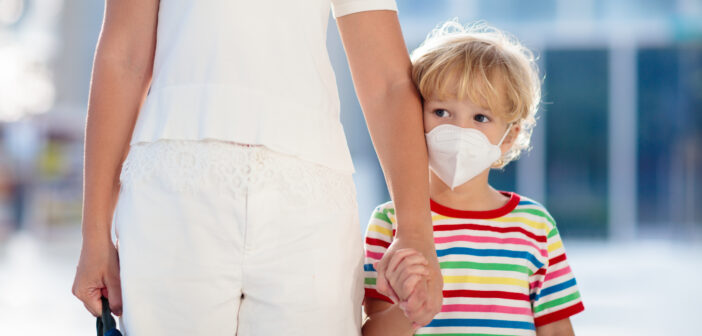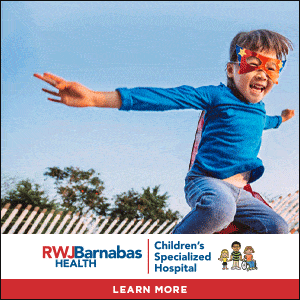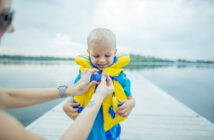As the COVID-19 pandemic continues to impact New Jersey and the world, there are still so many questions—about the virus, the medical developments and how we can safely protect our families. With the information changing almost daily, it’s hard to navigate everything we should be doing. To get a better understanding of all of it, I had the chance to interview one of New Jersey’s leading pediatric infectious disease experts, Dr. Margaret Fisher. She is the Medical Director of The Unterberg Children’s Hospital at Monmouth Medical Center, an RWJBarnabas Health facility, and Chair of Pediatrics for the hospital, and has been an instrumental part of the hospital’s and system’s COVID-19 response. Here, she touches on what we should be doing now and what the future holds for all of us, especially kids.
Protecting Your Family
As we move into eventual reopening in New Jersey, we’re all wondering how we can continue to best protect our families from exposure. Dr. Fisher says there are a few things to keep in mind.
“The instructions for contact tracing once someone tests positive is to identify people you’ve been in face-to-face contact with for 10 to 15 minutes. So, it doesn’t appear to be something you get by walking next to someone in the grocery store, it’s more face-to-face contact for an extended period of time,” says Dr. Fisher. When people talk, the droplets are usually released as far as 3-feet, hence the 6-feet rule for social distancing. “I think we’ll still be wearing masks in the next few months. We don’t know how effective they are in preventing infection, but they do collect droplets. Having the mask on decreases the amount of virus someone is shedding into the environment if the person is infected,” says Dr. Fisher.
And speaking of masks— she says we can limit the scare factor for children by making it into a game for little ones. “Older children understand better, but for younger ones who are apprehensive about wearing them, try to make it a positive. Tell them you want to see how long they can keep it on or how well they can keep their hands away from their face and make it playful,” she says. “And remember, masks are not recommended for kids under 2 because they may not be able to get it off if they’re having trouble breathing.” As for cleaning groceries and packages, Dr. Fisher says it’s recommended but do it in moderation. “You don’t have to go overly crazy about cardboard boxes, cans, groceries. Yes, they’re potential ways to be infected, but they’re not the major ways, and we don’t want to be germaphobes,” she adds.
COVID-19’s impact on kids
Because this virus is so new, the data and guidance surrounding it are constantly evolving. Currently, its impact on children continues to appear to be milder than adults. “We know from a few studies the amount of virus being shed from the child tends to be lower than from adults, and there are very few children who have died. This has been consistent with China, Italy, and the U.S. While there have been several pediatric deaths in the U.S., almost all have been in children with severe underlying illnesses. They are at much higher risk of getting into severe trouble,” says Dr. Fisher.
In terms of pediatric cases here in New Jersey, Dr. Fisher says most children hospitalized were discharged very quickly. “However, there has been a bit of an uptick with children and adolescents who are vaping altered materials like vitamin E, which can damage the lungs. If you put that on top of COVID, that’s a bad combination,” she said. And while the virus’ medical impact on children is relatively minimal, Dr. Fisher says the medical community has a lot of concerns about the big picture experiential impact on children. She notes that despite the virus having a more minimal impact on children than adults, there is concern in the medical field about the other overall impact on children. “We are seeing a decreased incidence of child abuse being reported, and we’re worried with children not in school and isolated at home, it’s going on but not recognized. And while everyone is concerned about how this is affecting mental health in adults, it’s a huge concern for kids too. Taking time away from all media is important because it can be depressing. Even if a TV is on in the background, they’re hearing it, so aim to have media-free time for the whole family,” she says. “Economic losses will have a tremendous effect on children, currently, 20 percent of our children live in poverty in NJ, and that is just a baseline, with numbers expected to rise. While children have generally been spared from the disease, they’re not going to be spared from the impact it’s going to make on their families and communities,” she adds.
Getting back to “normal”
When the state begins to reopen, Dr. Fisher expects it’s going to be a slow re-entry period. As all of us are wondering—when will it be safe to see the family members we’re missing so much right now? “I’m not sure I’d get on the first plane to see relatives. We understand people are contagious for a day before symptoms. Even if people appear well, you’re not going to know they’re infected. I’m not so much worried about the children as I am their parents and grandparents,” she says. “Drive-bys are never a problem but getting close could be. I wish I had better news on that. If it looks like after a few weeks things are pretty quiet, then we may adjust.”
And what about the school year in September? Dr. Fisher believes there are going to be large-scale adjustments. “We know as pediatricians that school is incredibly important to children, and as soon as it’s safe to reopen, we want it to reopen. I do think what we’ll see is a change in the way the classrooms work. I’m sure the Department of Education is thinking about staggered times so there will be fewer children per class, maybe continued virtual learning for kids on the days they’re not in school,” she says. Sports teams are still up in the air, and no one has a clear plan yet about how that will happen. “Athletic programs are especially important for kids, but currently there are no talks about when they will come back, what that will look like. It’s too early to know but it will be different,” says Dr. Fisher.
And for working mamas with younger ones, there’s the daycare dilemma. While some daycare centers are open for essential worker families, most are closed for the time being. “You want children to get back to their routines, on the other hand, we know childcare settings transfer bugs and spread rapidly from child to child. I’m not so much worried they’re going to get COVID, more that they might transmit to other people. But there are a lot of childcare centers open for essential workers and we have not seen any outbreaks related to those centers. I’m optimistic about them, but they will need to have small classes, separating kids,” Dr. Fisher said.
However it looks, it will be different. And we’ll all be navigating our new normal together, just as we’ve been doing these past two months.
This post is sponsored by RWJBarnabas Health to help every NJMOM be her healthiest.
Dr. Margaret Fisher, MD, FAAP, Pediatric Infectious Disease Specialist and Chair of the Department of Pediatrics and Medical Director for The Unterberg Children’s Hospital at Monmouth Medical Center, an RWJBarnabas Health Facility, is a world-renowned pediatric infectious disease consultant. In addition to making history as the first woman to serve as president of Monmouth Medical Center’s nearly 1,000-member medical and dental staff, she is former Chair of the Executive Committee of the American Academy of Pediatrics’ Section of Infectious Diseases and twice a member of the Committee of Infectious Diseases (Red Book Committee), positions in which she helped to establish national guidelines and standards for health care for children and adolescents.
A recipient of numerous awards, Dr. Fisher has been regularly identified as a “Top Doc” in the area of Pediatric Infectious Disease and is a frequent speaker for continuing medical education locally, regionally, nationally, and internationally.











